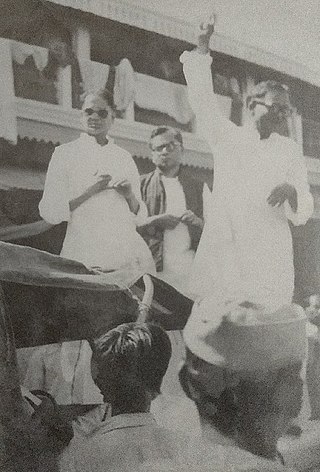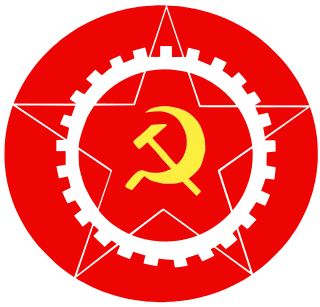Related Research Articles

The Independent Labour Party (ILP) was a British political party of the left, established in 1893 at a conference in Bradford, after local and national dissatisfaction with the Liberals' apparent reluctance to endorse working-class candidates. A sitting independent MP and prominent union organiser, Keir Hardie, became its first chairman.

The Congress Socialist Party (CSP) was a socialist caucus within the Indian National Congress. It was founded in 1934 by Congress members who rejected what they saw as the anti-rational mysticism of Gandhi as well as the sectarian attitude of the Communist Party of India towards the Congress. Influenced by Fabianism as well as Marxism-Leninism, the CSP included advocates of armed struggle or sabotage (such as Yusuf Meherally, Jayaprakash Narayan, and Basawon Singh as well as those who insisted upon Ahimsa or Nonviolent resistance. The CSP advocated decentralized socialism in which co-operatives, trade unions, independent farmers, and local authorities would hold a substantial share of the economic power.

The Indian Workers' Association (IWA) is a political organisation in Great Britain which consists of Indian immigrants to Britain and their descendants. IWA branches are organised in some major cities such as Birmingham and London. As one of the oldest and most active groups of immigrants, the organisation has been working in the fields of politics, race relations, industrial relations and social welfare, as well as many cultural issues. At the forefront of the struggle within trade unions, it has campaigned tirelessly against racism and on civil liberties issues.

The Burma Workers Party, until 1958 the Burma Workers and Peasants Party, was a communist party in Burma, formed on 8 December 1950 by leftist elements of the Socialist Party. In December 1962 it merged with the People's Comrade Party to form the United Workers Party. In March 1964, it was among the many parties banned by decree of the Revolutionary Council.

The Labour Party of Malaya was a political party in Malaya that was active between 1952 and 1969. It was originally formed as a confederation of state based labour parties known as the Pan-Malayan Labour Party (PMLP).
The Burma Socialist Party, initially known as the People's Freedom (Socialist) Party or PF(S)P, was a political party in Burma. It was the dominant party in Burmese politics after 1948, and the dominant political force inside the Anti-Fascist People's Freedom League. Because of its inclusion in AFPFL, it was colloquially known as ဖဆဆိုရှယ်.
The Asian Socialist Conference (ASC) was an organisation of socialist political parties in Asia that existed between 1953 and 1965. It was established in an effort to build a Pan-Asian multinational socialist organization, clearly independent from earlier European colonial centres, yet free from the new superpowers of the Cold War.
The Pakistan Socialist Party was a political party in Pakistan. It was formed out of the branches of the Indian Socialist Party in the areas ceded to the new state of Pakistan. The PSP failed to make any political breakthrough in Pakistani politics. Being a secular socialist party, which had strongly opposed the creation of the state Pakistan, the PSP found itself politically isolated and with little mass appeal. The party was labelled as traitors and kafirs by its opponents. The PSP found it difficult to compete with the Islamic socialism that Liaquat Ali Khan professed to in 1949.
The Trade Union Congress (Burma) was a central trade union organization in Burma. The TUC(B) was founded by the Socialist Party in November 1945, in an attempt to counter the influence of the communist-led All Burma Trade Union Congress. Ba Cho was the President of TUC(B). The TUC(B) was an affiliate of the governing Anti-Fascist People's Freedom League.

The National United Front was a political alliance in Myanmar.
The Hyde Park Movement Party was a left-wing political party in Thailand.
The Socialist Party of Indonesia was a political party in Indonesia. It was founded at a meeting in Jogjakarta on 13 November 1945. The Defence Minister Amir Sjarifuddin was the chairman of the party. Parsi was largely made up by Amir Sjarifuddin's former colleagues from the wartime resistance struggle in East Java. Some of them originated in Gerindo, a leftwing, nationalist and pro-Sukarno group active before the war. There were also some persons, like Abdulmadjid, Moewaladi and Tamzil, who had lived in the Netherlands during the war, and taken part in the anti-fascist resistance struggle there. The primary objective of Parsi was the independence of Indonesia from colonial rule, which was to be followed by the construction of a socialist society.
The Socialist People's Party was a political party in Indonesia. It was founded in Djakarta in 1945, and Sutan Sjahrir was the chairman of the party. In December 1945, at a meeting in Cheribon, the party merged with the Socialist Party of Indonesia, forming the Socialist Party with Sjahrir as chairman.
The Socialist Party was socialist political party in Indonesia which existed from 1945 to 1948. The party was founded as a merger between the Socialist People's Party (Paras) of Prime Minister Sutan Sjahrir and Socialist Party of Indonesia (Parsi) of Defence Minister Amir Sjarifuddin. Sjahrir became chairman of the unified party, whilst Sjarifuddin became vice-chairman.

The Labour Party of Indonesia was a political party in Indonesia.

The Labour Party was a political party in Indonesia. It was formed on 25 December 1949 by a group of former Labour Party of Indonesia (PBI) members, who had disagreed with the merger of PBI into the Communist Party of Indonesia.
The influences of socialism and socialist movements in Pakistan have taken many different forms as a counterpart to political conservatism, from the groups like The Struggle, Lal Salam which is the Pakistani section of the International Marxist Tendency, to the Stalinist group like Communist Party through to the reformist electoral project enshrined in the birth of the Pakistan People's Party (PPP).

The Viet Nam Democratic Socialist Party was a political party in South Vietnam.
Pulin De was a Bengali socialist leader. He was jailed for 12 years during British rule.

The International Workingmen's Association, often called the First International, was a political international which aimed at uniting a variety of different left-wing socialist, social democratic, communist, and anarchist groups and trade unions that were based on the working class and class struggle. It was founded in 1864 in a workmen's meeting held in St. Martin's Hall, London. Its first congress was held in 1866 in Geneva.